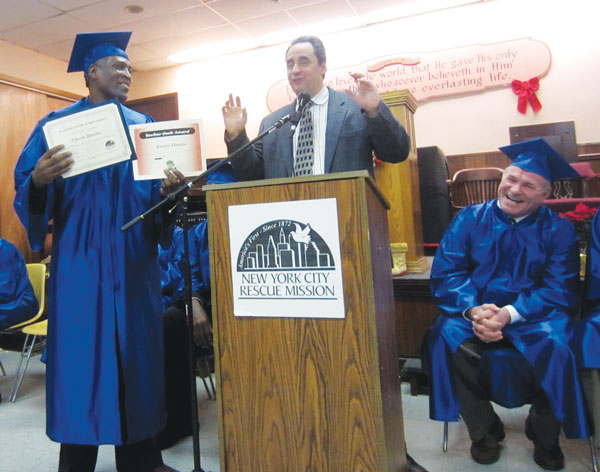 [/media-credit]
[/media-credit]
The very first step was to get and stay sober in order to create a more manageable life.
Upon graduation and having completed all 12 steps, each man commits to living a more noble life by serving others, according to the mission’s community relations manager Joe Little.
“The way they treat other guests and residents has drastically changed by the time they’re ready to graduate,” said program counselor Ben Caswell. “The proof is in the action.”
A total of 21 men graduated in 2011, setting a new record.
“A few months ago, we only had two men graduating. Now we’ve got seven graduating at once!” exclaimed Little.
If mission graduates follow the guidelines and stay connected with family, their chances of maintaining sobriety are greater than ever once they’ve completed the program.
Jeff, for example, tried to get sober in programs that sent men packing after less than a week. He spent last Christmas in a meth house in New Mexico. Soon after, an old friend tracked him down and offered to pay for his ticket into Lower Manhattan if he agreed to move into the mission, and he did.
Next week, he’ll be on his way back to New Mexico to reunite with his 9-year-old son, Jordan, who he hasn’t seen since last December.
Greg Manning’s first attempt to work a program also failed. Still, he was determined to change his life. Greg spent years keeping misdemeanor warrants out for his arrest so he would have “3 hots and a cot,” meaning three hot meals and a warm place to stay, even if it was in jail.
But having completed the program, Greg’s future appears bright. He plans to begin taking classes in ministry at Somerset Christian College next month, and to study drug counseling and psychology at Essex County College.
Though he has a heart condition and three other diseases, he is determined to stay healthy for his three-year-old daughter, Saniah Rose.
“I talk to her every single day on the phone. I ask her if she’s being a good girl, and she says ‘yes’ while her mother is screaming at her in the background,” he said with a laugh. “If I can’t see her because my duty keeps me here at the mission, she won’t come to the phone. But, eventually, she does, and she says, ‘I love you daddy, I miss you, when are you coming to get me?’”
Every Saturday, Greg leaves the mission at 7:30 a.m. and takes three trains to New Jersey so he can take Saniah with him to his weekly doctor appointment. Greg said she runs into his arms and squeezes his face to make sure he’s really there.
When they move into the mission, the men are given work assignments, like kitchen captain and security guard. Tutors help the men pick up where they left off in their education and prepare them to take the General Education Diploma exam. They are graded in seven separate areas: class participation, homework, work therapy, counseling, church attendance, quarters and hygiene, and “learning center.” The men are welcome to stay at the mission to live and do work service as they continue to try to find a job and a feasible living situation.
Nearly 23 million Americans currently suffer from alcohol and drug addiction, an incurable disease that doesn’t know race, age, gender or class.
Jerome, for example, was a fully functional, well-dressed binge drinker with a solid job as a paralegal and didn’t seem like a guy who always spiked his coffee with whiskey and spent every Christmas blacking out.
One day, while working in the courts at 100 Center Street, Jerome stopped into the mission for lunch while intoxicated. He ate, left and didn’t talk to anyone because he didn’t want to “eat with the bums.”
Many men approached him and tried to tell him about the program before he finally relented.
His landlord promised to hold another apartment for him in the complex as long as he came back with proof that he had completed the program.
While working in the mission’s kitchen, Jerome saw men coming in just as he had, unruly and intoxicated.
“If they try to start a problem or start cursing me out, I remember that I was there. They probably don’t know what they’re saying,” he said. “I put my hand on their shoulder and ask, ‘are you ok?’”
Jerome spent Christmas with his daughter at his mother’s house in Harlem; it was his first sober holiday in over a decade.
Last weekend, all of the men celebrated Christmas with loved ones, whether they were blood relatives or brothers at the mission. Wayne and Jeff started their celebration at the mission with a special sausage and egg breakfast followed by a Christmas service and a buffet dinner. Christmas movies were played on a projector throughout the day, and gifts were given out at noon. One anonymous donor provided K-mart gift cards for mission residents and another bought them all new sneakers and sweatshirts, which they received after graduation.
“I felt the heartiness of the gift because I did not ask for it but received it,” Greg noted. “I felt new and cool.”
Additionally, folks from New York Cares brought their coat drive to the shelter from 10 a.m. to 12 p.m.
“For many, a new coat is a necessity,” said Jeff. “But for us, even one that’s slightly used is a blessing.”
The men may be going their separate ways this week, but, as Jerome said in his graduation speech, they will all be taking a little piece of one another with them.
“The steps we take are no easy road,” said Jerome. “But the reward is great for those who take it.”
































